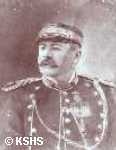|
|
|
|
|
|
|
|
|
| Title | Washington Post | |||
|---|---|---|---|---|
| Composer | Sousa, John Philip | Marshall’s Civic Band Topeka, KS Est’d 1884 |
Number | M-874 |
| Type | CB | |||
| Date | 1946 | |||
| Key | F | |||
| Arranger | Yoder, Paul |  |
Length | 0.00 |
| Publisher | Carl Fischer | Vocal | No | |
| Association | Newspaper: Washington Post | Grade/Difficulty | ?/? | |
| Last Performed | Unknown | |||
| Manuscript | No | |||
| Style | March | Location | ||
| Cataloger | Rick Baker | |||
| Date Cataloged | 08/27/1994 | |||
| Notes |
Composed in 1889. "During the 1880's several Washington, D.C., newspapers
competed vigorously for public favor. One of these, the 'Washington Post',
organized what was known as the Washington Post Amateur Authors' Association and
sponosred an essay contest for school children. Frank Hatton and Beriah Wilkins,
owners of the newspaper, asked Sousa, then leader of the Marine Band, to compose
a march for the award ceremony.
"The ceremony was held on the Smithsonian grounds on June 15, 1889.
President Harrison and other dignitaries were among the huge crowd. When the new
march was plyed by Sousa and the Marine Band, it was enthusiastically received,
and within days it became exceptionally popular in Washington.
"The march happened to be admirably suited to the two-step dance, which was
just introduced. A dancemasters' organization adopted it at their yearly
convention, and soon the march was vaulted into international fame. The two-step
gradually replaced the waltz as a popular dance, and variations of the basic
two-step insured the march's popularity all through the 1890's and into the
twentieth century. Sousa's march became identified with the two-step, and it was
as famous abroad as it was in the United States. In some European countries, all
two-steps were called 'Washington posts.' Pirated editions of the music appeared
in many foreign countries. In Britain, for example, it was known by such names
as 'No Surrender' and 'Washington Greys'.
"Next to 'The Stars and Stripes Forever, ' 'The Washington Post' has been
Sousa's most widely known march. He delighted in telling how he had heard it in
so many different countries, played in so many ways - and often accredited to
native composers. It was a standard at Sousa Band performances and was often
openly demanded when not scheduled for a program. It was painful for Sousa to
relate that, like 'Semper Fidelis' and other marches of that period, he received
only $35 for it, while the publisher made a fortune. Of that sum, $25 was for a
piano arrangement, $5 for a band arrangement, and $5 for an orchestra
arrangement.
"According to a letter dated September 28, 1920, from Sousa to Edward B.
McLean, editor of the 'Washington Post,' one edition of this music was published
in Mexico under the title 'Unser Pasa.'
"Today, at a community room in Washington, a spotlight illuminates a
life-sized color portrait of the black-bearded Sousa, resplendent in his scarlet
Marine Band uniform. This is the John Philip Sousa Community Room in the
Washington Post Building. It is the newspaper's tribute to the man who first
gave it worldwide fame."
The Works of John Philip Sousa
pg. 95
Paul E. Bierley
Integrity Press
1984
|
|||
|
MCB Home |
Concerts |
Library |
What's New |
History |
Contact Us |
FAQs |
Site Search
© 2002-2025, Marshall's Civic Band, Inc. |